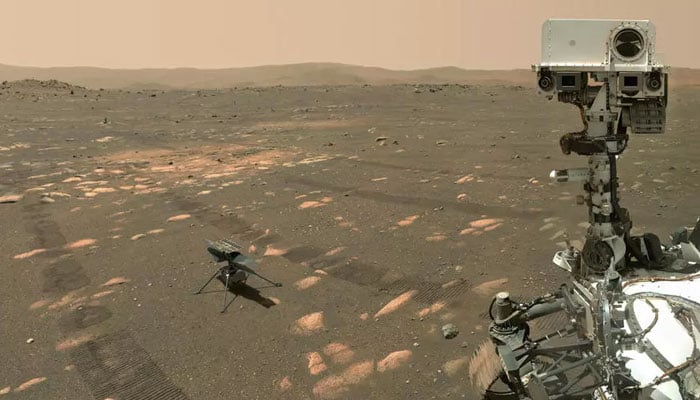China makes history as its probe safely lands on Mars
China´s Zhurong rover touches down on Red Planet
BEIJING: China´s probe to Mars touched down on the Red Planet Saturday to deploy its Zhurong rover, state media reported, a triumph for Beijing´s bold space ambitions and a history-making feat for a nation on its first-ever Martian mission.
The lander carrying Zhurong completed the treacherous descent through the Martian atmosphere using a parachute to navigate the "seven minutes of terror" as it is known, aiming for a vast northern lava plain known as the Utopia Planitia.
It "successfully landed in the pre-selected area", state broadcaster CCTV said in a special television programme dedicated to the mission called "Nihao Mars" ("Hello Mars").
The official Xinhua news agency cited the China National Space Administration (CNSA) in confirming the touchdown.
It makes China the first country to carry out an orbiting, landing and roving operation during its first mission to Mars -- a feat unmatched by the only other two nations to reach the Red Planet so far, the United States and Russia.
President Xi Jinping sent his "warm congratulations and sincere greetings to all members who have participated in the Mars exploration mission", Xinhua reported.
China has now sent astronauts into space, powered probes to the Moon and landed a rover on Mars -- the most prestigious of all prizes in the competition for dominion of space.
- Three-month mission -
Zhurong, named after a Chinese mythical fire god, arrived a few months behind America´s latest probe to Mars -- Perseverance -- as the show of technological might between the two superpowers plays out beyond the bounds of Earth.
Six-wheeled, solar-powered and weighing roughly 240 kilograms (530 pounds), the Chinese rover is on a quest to collect and analyse rock samples from Mars´ surface.
In a message published Saturday evening on the social network Weibo, the Zhurong greeted its "Earth friends".
"I´m still inside the landing pod," a post on its official account said. "Can´t wait to find out what´s on Mars."
The launch of China´s Tianwen-1 Mars probe which carried the rover last July marked a major milestone in China´s space programme.
The spacecraft entered Mars´ orbit in February and after a prolonged silence state media announced it had reached the "crucial touchdown stage" on Friday.
The landing was set to be a nail-biter for the China National Space Administration, with state media describing the process of using a parachute to slow descent and buffer legs as "the most challenging part of the mission".
It is expected to spend around three months there taking photos and harvesting geographical data.
The complicated landing process is called the "seven minutes of terror" because it happens faster than radio signals can reach Earth from Mars, meaning communications are limited.
"The distance was too far away that the spacecraft has to do it totally by itself," said Chen Lan, an independent analyst specialising in China´s space programme. "If there was something wrong, people on the Earth have no way to help."
Several US, Russian and European attempts to land rovers on Mars have failed in the past, most recently in 2016 with the crash-landing of the Schiaparelli joint Russian-European spacecraft.
The latest successful arrival came in February, when US space agency NASA landed its rover Perseverance, which has since been exploring the planet.
The US rover launched a small robotic helicopter on Mars which was the first-ever powered flight on another planet.
China has come a long way in its race to catch up with the United States and Russia, whose astronauts and cosmonauts have decades of experience in space exploration.
It successfully launched the first module of its new space station last month with hopes of having it crewed by 2022 and eventually sending humans to the Moon.
Last week a segment of the Chinese Long March 5B rocket disintegrated over the Indian Ocean in an uncontrolled landing back to Earth.
That drew criticism from the United States and other nations for a breach of etiquette governing the return of space debris to Earth, with officials saying the remnants had the potential to endanger life and property.
-
SpaceX cleared for NASA Crew-12 launch after Falcon 9 review
-
Is dark matter real? New theory proposes it could be gravity behaving strangely
-
Shanghai Fusion ‘Artificial Sun’ achieves groundbreaking results with plasma control record
-
Polar vortex ‘exceptional’ disruption: Rare shift signals extreme February winter
-
Netherlands repatriates 3500-year-old Egyptian sculpture looted during Arab Spring
-
Archaeologists recreate 3,500-year-old Egyptian perfumes for modern museums
-
Smartphones in orbit? NASA’s Crew-12 and Artemis II missions to use latest mobile tech
-
Rare deep-sea discovery: ‘School bus-size’ phantom jellyfish spotted in Argentina












